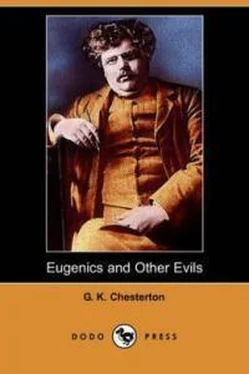That is the problem, and that is why there is now no protection against Eugenic or any other experiments. If the men who took away beer as an unlawful pleasure had paused for a moment to define the lawful pleasures, there might be a different situation. If the men who had denied one liberty had taken the opportunity to affirm other liberties, there might be some defence for them. But it never occurs to them to admit any liberties at all. It never so much as crosses their minds. Hence the excuse for the last oppression will always serve as well for the next oppression; and to that tyranny there can be no end.
Hence the tyranny has taken but a single stride to reach the secret and sacred places of personal freedom, where no sane man ever dreamed of seeing it; and especially the sanctuary of sex. It is as easy to take away a man's wife or baby as to take away his beer when you can say "What is liberty?"; just as it is as easy to cut off his head as to cut off his hair if you are free to say "What is life?" There is no rational philosophy of human rights generally disseminated among the populace, to which we can appeal in defence even of the most intimate or individual things that anybody can imagine. For so far as there was a vague principle in these things, that principle has been wholly changed. It used to be said that a man could have liberty, so long as it did not interfere with the liberty of others. This did afford some rough justification for the ordinary legal view of the man with the pot of beer. For instance, it was logical to allow some degree of distinction between beer and tea, on the ground that a man may be moved by excess of beer to throw the pot at somebody's head. And it may be said that the spinster is seldom moved by excess of tea to throw the tea–pot at anybody's head. But the whole ground of argument is now changed. For people do not consider what the drunkard does to others by throwing the pot, but what he does to himself by drinking the beer. The argument is based on health; and it is said that the Government must safeguard the health of the community. And the moment that is said, there ceases to be the shadow of a difference between beer and tea. People can certainly spoil their health with tea or with tobacco or with twenty other things. And there is no escape for the hygienic logician except to restrain and regulate them all. If he is to control the health of the community, he must necessarily control all the habits of all the citizens, and among the rest their habits in the matter of sex.
But there is more than this. It is not only true that it is the last liberties of man that are being taken away; and not merely his first or most superficial liberties. It is also inevitable that the last liberties should be taken first. It is inevitable that the most private matters should be most under public coercion. This inverse variation is very important, though very little realised. If a man's personal health is a public concern, his most private acts are more public than his most public acts. The official must deal more directly with his cleaning his teeth in the morning than with his using his tongue in the market–place. The inspector must interfere more with how he sleeps in the middle of the night than with how he works in the course of the day. The private citizen must have much less to say about his bath or his bedroom window than about his vote or his banking account. The policeman must be in a new sense a private detective; and shadow him in private affairs rather than in public affairs. A policeman must shut doors behind him for fear he should sneeze, or shove pillows under him for fear he should snore. All this and things far more fantastic follow from the simple formula that the State must make itself responsible for the health of the citizen. But the point is that the policeman must deal primarily and promptly with the citizen in his relation to his home, and only indirectly and more doubtfully with the citizen in his relation to his city. By the whole logic of this test, the king must hear what is said in the inner chamber and hardly notice what is proclaimed from the house–tops. We have heard of a revolution that turns everything upside down. But this is almost literally a revolution that turns everything inside out.
If a wary reactionary of the tradition of Metternich had wished in the nineteenth century to reverse the democratic tendency, he would naturally have begun by depriving the democracy of its margin of more dubious powers over more distant things. He might well begin, for instance, by removing the control of foreign affairs from popular assemblies; and there is a case for saying that a people may understand its own affairs, without knowing anything whatever about foreign affairs. Then he might centralise great national questions, leaving a great deal of local government in local questions. This would proceed so for a long time before it occurred to the blackest terrorist of the despotic ages to interfere with a man's own habits in his own house. But the new sociologists and legislators are, by the nature of their theory, bound to begin where the despots leave off, even if they leave off where the despots begin. For them, as they would put it, the first things must be the very fountains of life, love and birth and babyhood; and these are always covered fountains, flowing in the quiet courts of the home. For them, as Mr. H.G. Wells put it, life itself may be regarded merely as a tissue of births. Thus they are coerced by their own rational principle to begin all coercion at the other end; at the inside end. What happens to the outside end, the external and remote powers of the citizen, they do not very much care; and it is probable that the democratic institutions of recent centuries will be allowed to decay in undisturbed dignity for a century or two more. Thus our civilisation will find itself in an interesting situation, not without humour; in which the citizen is still supposed to wield imperial powers over the ends of the earth, but has admittedly no power over his own body and soul at all. He will still be consulted by politicians about whether opium is good for China–men, but not about whether ale is good for him. He will be cross–examined for his opinions about the danger of allowing Kamskatka to have a war–fleet, but not about allowing his own child to have a wooden sword. About all, he will be consulted about the delicate diplomatic crisis created by the proposed marriage of the Emperor of China, and not allowed to marry as he pleases.
Part of this prophecy or probability has already been accomplished; the rest of it, in the absence of any protest, is in process of accomplishment. It would be easy to give an almost endless catalogue of examples, to show how, in dealing with the poorer classes at least, coercion has already come near to a direct control of the relations of the sexes. But I am much more concerned in this chapter to point out that all these things have been adopted in principle, even where they have not been adopted in practice. It is much more vital to realise that the reformers have possessed themselves of a principle , which will cover all such things if it be granted, and which is not sufficiently comprehended to be contradicted. It is a principle whereby the deepest things of flesh and spirit must have the most direct relation with the dictatorship of the State. They must have it, by the whole reason and rationale upon which the thing depends. It is a system that might be symbolised by the telephone from headquarters standing by a man's bed. He must have a relation to Government like his relation to God. That is, the more he goes into the inner chambers, and the more he closes the doors, the more he is alone with the law. The social machinery which makes such a State uniform and submissive will be worked outwards from the household as from a handle, or a single mechanical knob or button. In a horrible sense, loaded with fear and shame and every detail of dishonour, it will be true to say that charity begins at home.
Читать дальше








